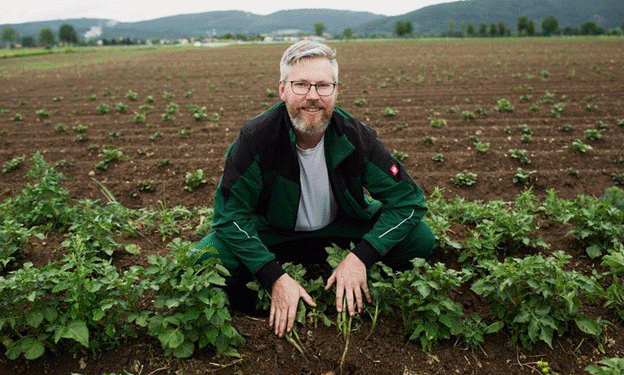In the Öko-Modellregion Stadt.Land.Regensburg, a pioneering initiative is underway to strengthen regional food systems by building reliable value chains for organic pre-peeled potatoes. The project focuses on meeting the growing demand for organic food in the community catering sector, where large kitchens often require pre-processed, kitchen-ready ingredients. However, sourcing such products locally has been a challenge, particularly for bio-pre-peeled potatoes. By fostering strong partnerships and ensuring a steady demand for these products, the region is transforming its agricultural supply chain into a sustainable, locally integrated system.
The Need for Processed Organic Products in Community Catering
As demand for organic and regional foods grows in institutional kitchens, there is an increasing need for processed products like peeled potatoes that are ready for cooking. However, many large kitchens face difficulty finding local suppliers who offer these pre-processed organic products. To meet this need, the Öko-Modellregion Stadt.Land.Regensburg has worked to build specific value chains for organic pre-peeled potatoes, uniting local farms, processing facilities, and caterers.
The key to success in building these local value chains is ensuring that the entire system, from farms to kitchens, operates smoothly within tight timeframes. Farmers must produce enough high-quality potatoes that meet the necessary specifications, while processing plants must have the infrastructure to peel and prepare the potatoes. The demand from community kitchens, however, plays a critical role in pulling these value chains together.
Creating Reliable Demand for Organic Potatoes
To better understand the demand for pre-peeled organic potatoes in the region, Elke Oelkers, Project Manager of Biostadt Regensburg, conducted a comprehensive demand analysis among local large kitchens. The results showed that there is a need for approximately 350 tons of pre-peeled organic potatoes per year in the Regensburg region. This insight, along with political support, is creating a solid foundation for ongoing demand. In fact, Regensburg city officials have committed to increasing the percentage of bio-regional products in their municipal kitchens, aiming for at least 30% by 2025 and 50% by 2030.
Building Local Partnerships: The Case of the Zirngibl Family’s Regional Processing Plant
The key to success for local farms and processors is to form long-term, reliable partnerships with community caterers. The Zirngibl family’s processing plant serves as a prime example. By securing a partnership with Brunner’s Kidsmenü, a major local caterer providing meals for over 4,000 children daily, the Zirngibl plant has been able to produce 12 to 15 tons of organic pre-peeled potatoes annually. Additionally, they supply Johanniter Menüservice, which serves schools in the region, with about 350 kilograms per week.
Such reliable demand from catering services is crucial for farmers to plan their production in advance. According to Julius Kuschel, responsible for the Öko-Modellregion, farmers need firm commitments from buyers at least a year in advance to ensure they can secure sufficient planting material and organize their harvest in time. Without this reliable market demand, it would be difficult for farmers to transition to organic production, especially with the added complexity of meeting the specific quality standards for peeled potatoes.
Key Success Factors: Coordination and Logistics
While the demand is there, the success of building local value chains also hinges on effective coordination. The regional project relies heavily on the roles of “connectors” like Elke Oelkers and Julius Kuschel, who are responsible for coordinating between the farms, processors, and caterers. Having dedicated people who can facilitate communication and resolve any issues that arise is crucial for ensuring smooth operations and building long-term trust within the value chain.
Moreover, the involvement of established conventional processing companies in building these value chains can help bridge the gap between traditional agriculture and organic farming. Dominik Heitzer, an organic farmer, expanded his operations to include pre-processing by investing in new technology and infrastructure, receiving support through regional grants. By doing so, Heitzer’s farm now processes and markets organic potatoes and vegetables to local restaurants and caterers. He sees this as an opportunity to transition his farm from part-time to full-time operations, contributing to a growing local food economy.
The Role of Local and Regional Policy
The support from local and regional policy has been instrumental in this development. With clear targets for increasing the share of bio-regional products in public procurement and community catering, the political will to support sustainable local food systems ensures that long-term demand for organic products remains strong. This, in turn, helps to secure the future of organic farming in the region, providing a stable market for farmers and processors alike.
A Model for Regional Food Systems
The creation of a regional value chain for organic pre-peeled potatoes in the Stadt.Land.Regensburg area is a shining example of how community catering and sustainable agriculture can intersect to create a more resilient and sustainable food system. By building strong partnerships, ensuring reliable demand, and supporting local businesses, the region is creating a model that could be replicated elsewhere. This approach not only supports local farmers but also ensures that institutional kitchens have access to high-quality, organic products. As more regions follow this example, the future of bio-regional food systems looks promising, contributing to healthier communities and more sustainable agricultural practices.





